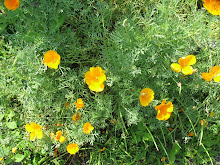

Let me pick up where I left off earlier this week, about my wondering whether or not I contaminated the other compost bin with bindweed.
In a panic, I shot an email to a friend of mine who is not only a fellow gardener, but somewhat of an expert on weeds. Could he look at my plot? What should I do if the weed I had been pulling was the dreaded bindweed? Should I take responsibility in some way?
A few days passed--no answer. Perhaps he had forwarded my email to the Steering Committee and a tribunal for my extradition from the garden was being scheduled. But on the 4th, I came in contact with three committee members who made no mention of my blunder.
The next day, in one of my raised beds in my backyard, I spotted a few morning glory upstarts near my snap peas. "That's bindweed," my husband said plainly.
Later, over at the community garden, I noticed to my relief that whatever I had invaded my plot was not the same, though it had run rampant throughout many garden beds and common areas. I pulled one and showed it to my friend Kim, who identified it as pigweed. I snapped the photos above of the two weeds later in their development. The first one is bindweed growing in a compost bin, and the second is pigweed (I am struggling with adding photos; I tried to place them below, but I can't seem to put them where I want!). You can see what bindweed can do in such a short span of time!
Three factors contributed to my ignorance: 1) a poor ability to identify plants, 2) a poor visual memory, and 3) one photo of bindweed in the early stages bearing some resemblance to the pigweed I pulled from my plot.
So, now I'm fairly sure that I composted pigweed, which is still invasive, competing for water and nutrients with whatever I've been growing on purpose. It may not have the choking potential of bindweed, but it's made me wonder if I should dispose of all my invasive weeds with the trash.


1 comment:
I always assume that invasive weeds that have not gone to seed die in the compost bin, so I don't worry about those. Maybe I am too casual about this. The books all say that the heat of the compost will kill the seeds, but I don't play with the composition of my compost enough to make it very hot--I really could use more grass clippings, which really heat things us, but I prefer to leave the clippings on the lawn for their nutrient value as they decay. In any case, the lawn near my garden, although mowed, contains nearly all the noxious weeds, so constantly they move into the edges of the garden anyway.
Post a Comment